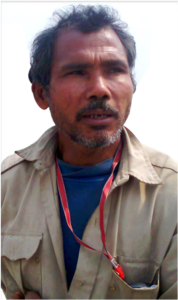
Majuli (in Assam) is known for many things, to be the largest river island in the world, to be the first island to be a district in India, to sustain a unique culture of its own. But what it is not known for is its dense forests. Majuli at an area of 880 square kilometres (340 sq mi) was the largest river island in India at the beginning of the 20th century but due to the growing River Brahmaputra the island has lost a lot of land. Due to erosion it now covers about 352 square kilometres (136 sq mi) only as at 2014. This is mainly due to the growing population and civilization on the island leading to deforestation. The barren land of sandbars makes an easy target for erosion and takes away huge chunks of land at once. The island is slowly washing away, grain by grain.

And out of the 15,000 people inhabiting the land there is but only one man who took action to stop this. In the monsoon of ’79, Brahmaputra like every year flooded its banks. And when the water receded there was an abundance of writhing snakes left behind on the sandbars of Majuli. But son in the heat of the sun these snakes died. It might have been just another insignificant phenomenon of nature if one fourteen year old didn’t have noticed that. Jadav “Molai” Payeng was moved by this and questioned the future of humanity. With these questions he went to the local head of the Deori community. The elder’s mocked the curiosity of this kid but didn’t dismiss it and sent him back with five bamboo samplings. And using the shallow bamboo shoot to carry water from the river he planted the first sampling of what went on to become the Sanctuary named the Molai Forest. He built up this forest on the barren land against all odds and mockery. Now his forest stretches over a land of 550 hectares and still growing.
By 2008, the forest was harboring fauna and soon homed a herd of 115 elephants. But it backfired when they started ravaging through the nearby villages. The villagers were furious with the loss of harvest and destruction and headed to paying. But Payeng faced them fearlessly like the many other times he did. Soon the number of animals started increasing with rhinos, deer, tigers it started looking more like a proper forest. And after 40 years, Majuli saw vultures again.

Jadav Payeng is an unsung hero who worked in the shadows happily until 2008 when the Jorhat based journalist, Jitu Kalita stumbled across him and his forest on one of his nature photography trips. At first, Payeng shooed him away thinking of him as a poacher. After five days, Jitu came back but this time with ore people. They awarded him Rs.500 and a letter of appreciation and soon the news channels followed. The story of the one-man made forest spread as major media starting covering it and Jadav Payeng’s hard work was rewarded. In 2012, he was honoured at a public function arranged by the School of Environmental Sciences of Jawaharlal Nehru University and the vice-chancellor, Sudhir Kumar Sopory named him as the ‘Forest Man o India’. He was also honoured by Dr. A. P. J. Abdul Kalam in Mumbai in the Shanmukhananda Sangeet Sabha’s diamond jubilee. And in 2015, he was awarded the Padma Shri.
But more than his awards and honors he treasures the exposure that Payeng got for his work. It serves his motive easily for his main motive in life has always been to save the Earth. Now Jadav Payeng got a voice to preach his great ideas of ingraining environmental care in our lives. His brilliant ideas enlighten many minds for the healthier approach of the world. What Payeng believes is we can only change it if we integrate practically growing trees in our curriculum. Just studying about the dying Earth is not enough and a child should be made responsible to grow his own tree. He was great ideas on curbing air pollution and soil erosion and is even more eager to implement them only if he is provided the ear to implement it. According to Jadav Payeng in 2030, India will be the most populated nation in the world and saving the earth will be our priority. But only trees can save the Earth, nobody else. So he urges that we bring the knowledge to practice and leave our seats to get our hands dirty.


One Response
Have you ever considered writing an e-book or guest authoring on other sites?
I have a blog based on the same ideas you discuss and would really like to have you share
some stories/information. I know my visitors would appreciate your
work. If you’re even remotely interested, feel free to send me an email.